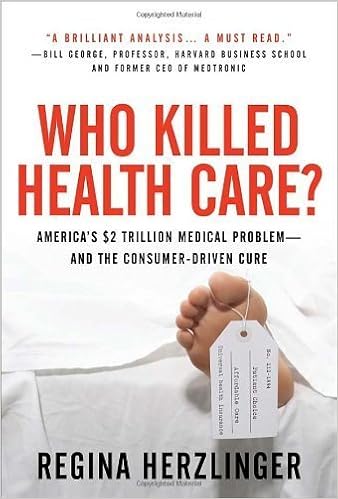Much of the loud clamoring about the recently passed stimulus health-care provision targets “comparative effectiveness research.” Steven Pearlstein of The Washington Post notes the criticism comes mostly from those with a conservative perspective who believe, or at least profess to believe, that “the market” is supposed to magically keep costs down and health care, like any other commodity, affordable.
I think we’re well beyond the point of considering health care affordable.
The “market” has nothing to do with who has access to health care and how affordable it is precisely because big business has usurped the physician-patient relationship where health care decisions should be made. There are few independent physicians left. Most work for large hospitals and clinics who expect them to generate a sizable amount of billings for their employer and who often require that physicians see at least four patients an hour. Yes, that’s a patient every 15 minutes. Physicians have been fired for seeing fewer patients than their expected quota no matter how complicated the medical problems of their patients may be.
To add insult to injury, the insurance companies are standing right behind the big business clinics telling physicians what they will pay for regardless of whether the patients need the care prescribed by the physician.
Oh, and then there’s the government programs, Medicare and Medicaid, adding another layer of insulation between the physician and patients who need care.
Being as how big business, insurance companies, and government programs already severely limit a physician’s ability to provide needed care to patients, it seems odd that the “comparative effectiveness research” element should cause so much pain in the “free market” community.
While Pearlstein admits that this kind of research, done badly or used to deny expensive but needed care from patients is a genuine point of concern. Pearlstein even admits that this kind of research has been used precisely for these purposes in countries which have nationalized health care.
Interestingly, Pearlstein indicates we already have skyrocketing health care costs because this kind of research isn’t blocking the high-dollar kinds of technology, drugs, and treatments which generate hugh profits for businesses in heath care, for-profit businesses who basically have no competitive market to control costs.
Pearlstein does admit there is reason to be concerned that this research is done well and does not prevent patients from getting the kinds of care they need because insurance companies refuse to pay for more expensive treatments. This is a huge caveat. This kind of research is already being used to deny care in countries with nationalized health care.
Unless the physicians who make the decisions in this process are the treating physicians, this kind of comparative effectiveness research will suffer the same fate in this country as it has elsewhere. In other words, the medical decisions are still not in the hands of the treating physician and the patient.
 There’s a certain irony here. The great promoters of “market” control of health care costs have very successfully avoided the controls of their beloved “market” but now are fiercely protecting their privileged position under the guise of protecting us from single-payer system “dangers.”
There’s a certain irony here. The great promoters of “market” control of health care costs have very successfully avoided the controls of their beloved “market” but now are fiercely protecting their privileged position under the guise of protecting us from single-payer system “dangers.”
Regina Herzlinger has it right. In her book Who Killed Health Care, she argues that until the health care decisions are put back into the hands of physicians and their patients, nothing will change.


